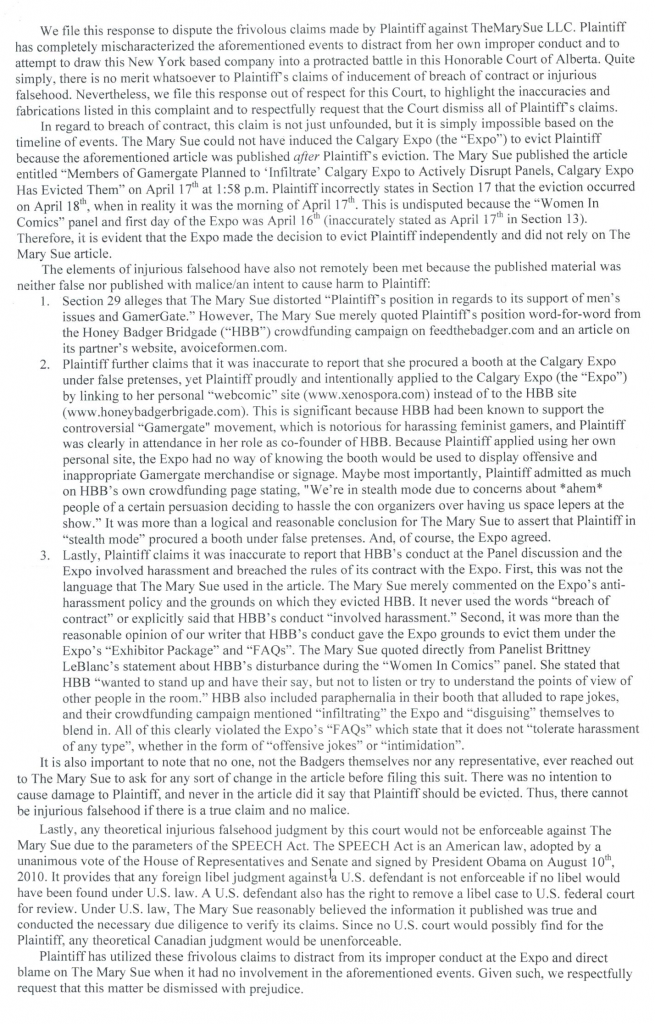The Mary Sue cites its adherence to Ethical Journalistic Standards as part of it’s defense against having allegedly engaged in injurious slander against the Honey Badger Brigade.
The Honey Badger Brigade has received a response from The Mary Sue in regards to the HBB’s legal suit against them for incitement to breech of contract and injurious slander in regards to the expulsion of the HBB from the Calgary Comics and Entertainment Expo. The text of the Mary Sue’s response is reproduced below:
Mary Sue claims a lack of involvement in Calgary Expo’s choice to expel the Honey Badgers from the event. However, in response to questions on twitter following our expulsion, the expo’s staff referenced The Mary Sue’s article about the event. The Mary Sue’s prior and existing relationship with Calgary Expo is further demonstrated by an April 15th article promoting the Mary Sue sponsored cosplay contest which was to take place at the event. Mary Sue weekend editor Sam Maggs was the first person to respond to Britany le Blanc’s first tweet objecting to “MRAs in the audience” at the women into comics panel.
The Mary Sue claims their article was not defamatory because it “merely quotes from” our fundraiser. That argument disregards the amount of editorializing which was included in that article, which presented a clearly satirical joke as a literal statement of fact and included statements even their own commenters questioned. The article’s writer, Jill Pantozzi, has a history of articles written on the subject of the joke, the Fake Geek Girl accusation phenomenon. Some of her other work even covered similarly satirical humor on the topic. Pantozzi’s other writing on the topic makes it clear that her misrepresentation of the intent behind the joke on our fundraiser page was knowing, willful, and deliberate.
The Mary Sue’s next defense infers that having Gamergate represented on the Honey Badger anti-censorship poster constitutes harassment.
This inference is contained in the use of the argument that Gamergate is “notorious for harassing women.” This argument is presented without evidence, while arguing Calgary Expo’s case against the only woman ever excluded from an event because of a Gamergate controversy… a female comic book artist who was evicted from a “Women into comics” panel for answering a loaded question about a group she’s a part of, after asking for and being given permission to do so.
The Mary Sue’s argument infers that displaying the anti-censorship banner with Gamergate referenced on it was the reason the Honey badger Brigade was evicted, but at no point did the Expo offer an explanation which would confirm that, and it contradicts statements tweeted by the one person The Mary Sue chose to interview for their article. Brittany Le Blank’s statements directly attributed the expulsion to the panel discussion.
The Mary Sue argues that the Expo had no way of knowing that the Honey Badger Brigade was the entity which would be represented in the booth.The Expo had “Honey Badger Brigade printed in a publication, on several badges and on a banner for the booth, indicating clear knowledge of which group the booth was purchased to represent. Expo staff interacted directly with Alison and other Honey Badgers during the booth’s setup. It is ludicrous to argue that they did not know our name.
The Mary Sue’s last numbered point seems to state that couching their accusation in inferred terms instead of direct language by presenting the Honey Badger Brigade’s alleged actions and the Expo’s response in conjunction with the text of Expo policy excuses putting it into print. Following that, the Mary Sue acknowledges quoting one party involved in the complaints that led to the expulsion, then in the next sentence excuses themselves from responsibility for getting the full story from everyone involved, instead presuming the Honey Badger Brigade responsible for doing their journalistic work for them by contacting them to correct their unprofessional coverage.
The Mary Sue claims to have meant no harm, but their actions make it clear that from the beginning the article was intended to promote a narrative. The piece based imputations of malice on the word of one interviewed panelist and a joke the writer’s published history makes it hard to believe she didn’t get. In their own argument, The Mary Sue admits to having made no effort to contact any of the Honey Badgers for comment or explanation, a basic expectation for any journalist and one which numerous other publications were able to meet. The Mary Sue made definitive, defamatory statements about a group they could have contacted, but chose to avoid.
Finally, The Mary Sue, after inadvertently admitting they declined to contact Alison before creating their story about her, claims that Alison’s lawsuit wouldn’t stand in the U.S. due to their “reasonable” belief that publishing their narrative as fact without investigation constitutes “due diligence” sufficient to ensure that the article was true. Due journalistic diligence exercised by a writer not intending to do harm would have, at the very least, involved investigating to get the full story before writing an article.
- REMINDER: Badger Meetups in August and September! - August 15, 2025
- Lilith, feminism’s perfect icon? - August 15, 2025
- Badger Meetups in August and September! - July 8, 2025
